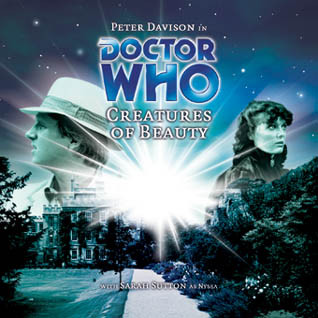This is one of my old favorites by Nick Briggs. When I first heard this a decade or so ago, after I realized early on that the tale was being told out of chronological order, I first thought naturally of "Pulp Fiction". This is definitely not one of your run of the mill Doctor Who stories for other reasons as well. In many ways I always thought of the 5th Doctor as more vulnerable than his immediate predecessors. While the 3rd and 4th Doctors always seemed to take charge of things quickly, it always seemed like the 5th Doctor would be swept up in events, and struggle to work his way out of them.
This is a very bleak tale. It's can easily be interpreted as an allegory on pollution and/or global warming. The setting is a planet which has been half way destroyed by a lethal radiation that was accidentally delivered to their atmosphere by aliens trying to dispose of a dangerous source of power. By taking some illegal short cuts, the aliens ultimately doomed the world of Veln when they had an accident near the planet. The vast majority of the people of Veln are now genetically deformed and will not live beyond a few more generations. This leaves them understandably full of bitter hatred towards the Koteem who doomed them to their tragic end.
As noted above, this story is told out of chronological sequence. While it would be easy to call this a gimmick, it truly does work well. It also allows Briggs to leave out some details that would seem like huge holes in the story, but ends up working well with the listener already trying to fill in gaps just because they know they are hearing things out of order. The star of this show is David Daker, who was unforgettable as Irongron in the Pertwee classic "The Time Warrior". On the surface, Daker is the most villainous character in the story. The head of a corrupt government police force which brutally arrests Nyssa, he is beyond bitter at the cruel hand fate has dealt him. He also has contempt for the few "beauties" he has to encounter. Besides Nyssa, the ultra-wealthy have expensive surgeries to restore a "normal" appearance. As nasty as Daker's character Gilbrook is, he isn't a cartoon villain. One of the final scenes where he recounts how his grandfather told him about the Koteem ship's explosion (visible in the sky) which rained down the deadly dyestrial pollution that would doom their planet, his performance is very understated. As awful, and unlikeable as he has been in this story, you can't help but feel pity for him.
This is really a perfect story for the 5th Doctor. Briggs wanted to have a story where the Doctor doesn't really try to save the day, but just tries to escape. In that regard, this reminds me of the best 5th Doctor TV story "The Caves of Androzani". Briggs also cleverly explores the notions of unintended consequences of the Doctor's arrival on planets. It's a rare story where the listener ends up knowing much more about what really happened on this doomed planet than the Doctor and Nyssa do once they escape in the TARDIS. There is also a lot of moral ambiguity. There seems to be a group of well meaning rebels who have a "cure" for the people of Veln. But, when the plan is revealed to the Doctor (and the listener), a lot of ethical questions are brought up.
Briggs also directed the story, and provided the music. Briggs' music is generally recognizable. It's often consists of dark, sinister melodies, and that is certainly the case here. It really adds to the overall atmosphere of the story. My only real gripe with this production is that the voice effect of the Koteem is a bit too similar to that of the Cybermen in "Sword of Orion".
This story is another example of how Big Finish at times makes a much more adult brand of Doctor Who. I am also surprised the TV show has never ripped off this idea of telling a story completely out of sequence. I really enjoyed this story the first time I heard it a decade ago, and my opinion hasn't changed listening to it this week. There are a lot of nice touches, like the creepy echoing of Daker uttering the word "beautiful" at times in the story. It's great when late in the story, you hear the context for the quote. The ending is a great shocker as well, further punctuating the depressing tone. While this couldn't be more different than the classic it follows, it just emphasizes how diverse Doctor Who can be. This is part of strong run for Big Finish in the show's 40th anniversary.
Rating: Great

No comments:
Post a Comment